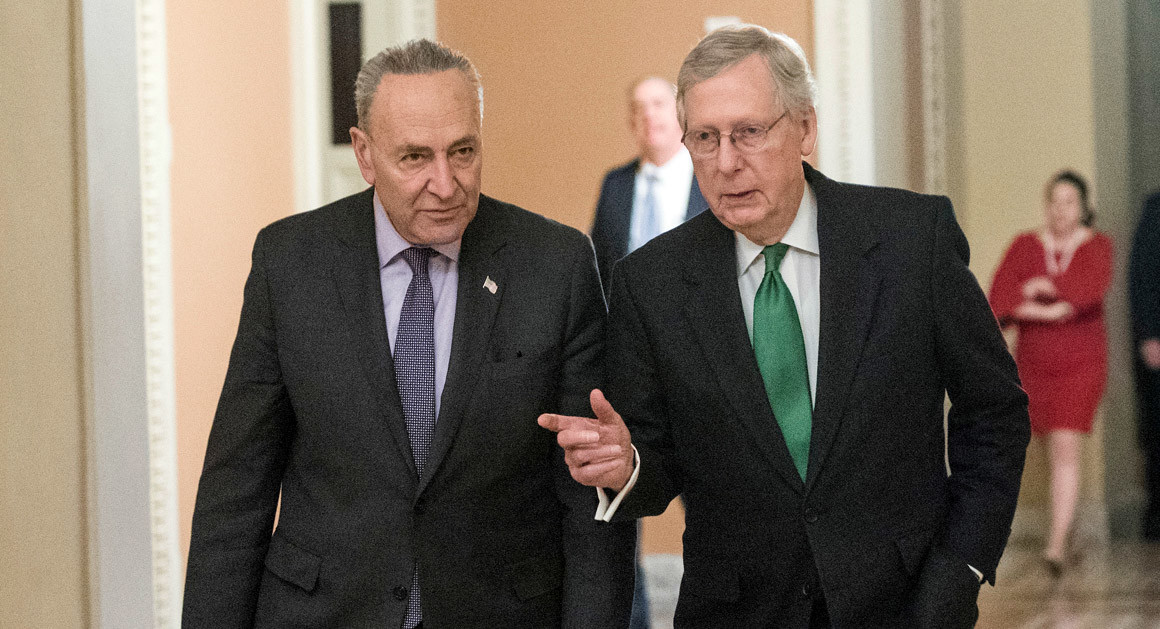Agreement still faces objections from conservative Republicans and from Democrats concerned about young immigrants
Developments on Day 384 of the Trump Administration:
See also Podcast: Trump Administration Left in Cold Amid Korean Rapprochement
Podcast: When Donny’s Troops Come Marching at Home
Spending Limits Raised on Military, Domestic Programs
Senate GOP and Democrat leaders announce a spending agreement to add about $300 billion to military and domestic programs over the next two years while raising the federal debt limit.
The deal could avert another Government shutdown. A fourth round of supplemental funding — necessary because the Trump Administration has yet to present a final budget to both houses of Congress — was agreed last month only after a three-day closure of Government offices.
Senate Majority Leader Mitch McConnell and Minority Leader Chuck Schumer announced the deal on Wednesday to raise the caps, imposed in 2011 at the insistence of Republicans as part of a deal with the Obama Administration.
The limit on military spending will be increased by $80 billion in the current fiscal year and $85 billion in the next year, which begins October 1. The limit on non-defense spending will increase by $63 billion this year and $68 billion next year.
Schumer said the deal includes $20 billion for infrastructure, $6 billion for the opioid crisis and mental health, $5.8 billion for child care, $4 billion for veterans hospitals and clinics, and almost $90 billion in disaster relief in response to last year’s hurricanes and wildfires.
The agreement authorizes an additional four-year extension of funding for the Children’s Health Insurance Program, on top of the six-year extension that Congress approved last month. The Trump Administration and Republicans in Congress had allowed the expiry of CHIP, which covers almost 9 million children, last September.
By raising the debt limit until March 2019, the accord staves off an imminent crisis. The Congressional Budget Office recently projected that the Treasury would probably run out of cash in the first half of March if the limit were not raised.
The agreement does not substitute for a full budget, which could face a battle over large proposed cuts in almost every Government department except the military, homeland security, and veterans affairs. Nor is there any indication of how the spending increases, on top of a $1.5 trillion tax cut pushed through Congress by Republicans in December, will be funded.
The Federal Government’s annual deficit is now expected to be more than $1.1 trillion in 2019.
And the deal was immediately challenged by House Minority Leader Nancy Pelosi, who objected that the accord offered no resolution of the status of almost 800,000 young undocumented “Dreamer” immigrants. Up to Wednesday, Democrats had insisted that any provisions for Government spending must also ensure the right to remain of the Dreamers. The young immigrants are threatened by deportation from March 5, when the Trump Administration ends the Deferred Action for Childhood Arrivals program authorized by Barack Obama in 2012.
Pelosi delivered a record-breaking speech on the House floor for the entire day and into the night.
Conservative Republicans, upset over the spending increases and raising of the debt ceiling, also mobilized. Senator Mike Lee of Utah said the agreement is “a betrayal of everything limited government conservatism stands for”.
For now, the spending deal largely negates the Trump Administration’s proposed deep cut in non-defense programs, including the operations of the State Department, environmental protection, foreign aid, health and climate change research, agricultural support, and programs for low-income Americans.
However, White House Press Secretary Sarah Huckabee Sanders proclaimed victory, “The bottom line is that, thanks to President Trump, we can now have the strongest military we have ever had.”
Trump gave his endorsement on Twitter:
The Budget Agreement today is so important for our great Military. It ends the dangerous sequester and gives Secretary Mattis what he needs to keep America Great. Republicans and Democrats must support our troops and support this Bill!
— Donald J. Trump (@realDonaldTrump) February 7, 2018
But critics were quick to pull out a Trump tweet from 2013 to suggest hypocrisy:
I cannot believe the Republicans are extending the debt ceiling—I am a Republican & I am embarrassed!
— Donald J. Trump (@realDonaldTrump) January 23, 2013
Top Official: Russia Penetrated US Voting Systems in 2016
Russia penetrated the voter registration rolls of several US states before the 2016 Presidential election, according to the US official in charge of protecting American ballots from hacking.
Jeanette Manfra, the head of cybersecurity at the Department of Homeland Security, says in an interview, “We saw a targeting of 21 states and an exceptionally small number of them were actually successfully penetrated.”
Jeh Johnson, the head of DHS during the Russian intrusions, adds:
2016 was a wake-up call and now it’s incumbent upon states and the Feds to do something about it before our democracy is attacked again.
We were able to determine that the scanning and probing of voter registration databases was coming from the Russian government.
Officials said there is no evidence that any of the registration rolls were altered.

